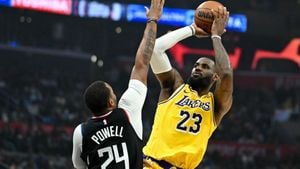Elon Musk made headlines over the weekend after he delivered a virtual address to thousands of supporters of Germany's Alternative for Deutschland (AfD) party, emphasizing the importance of preserving German culture and hinting at self-determination from European Union influences. Musk's comments at the rally on February 3, 2024, took place before the impending general elections scheduled for February 23, making his remarks all the more significant.
Speaking to approximately 4,500 attendees at the rally held in Halle, Musk stated, "It’s good to be proud of German culture, German values, and not to lose those in some sort of multiculturalism..." His words sparked both fervor among AfD supporters, who see the party as their best hope, and outrage among critics who fear such rhetoric fuels far-right ideologies.
The billionaire tech mogul voiced his excitement for AfD's candidate for chancellor, Alice Weidel, asserting, "I’m very excited for the AfD, I think you’re really the best hope for Germany... fight for a great future for Germany." This rhetoric aligns with the AfD’s anti-immigration stance and its push against what they perceive as excessive EU bureaucracy.
Musk's assertions were not limited to present-day politics; he delved deeply, referencing Germany's tumultuous history. "Children should not be guilty of the sins of their parents... let alone their great-grandparents," he remarked, drawing ire from those who felt he was downplaying Germany's responsibility for its past, particularly the atrocities committed during the Nazi regime.
The evening of the rally saw significant protests erupting across Germany. Demonstrators turned out en masse, with figures rising to about 100,000 in Berlin alone, as they rallied against the surge of far-right sentiment amplified by figures like Musk. Protesters carried vibrant umbrellas and chanted slogans, sending clear messages of opposition to the AfD’s views. This coincided with calls from various organizations, including Fridays for Future, who organized what they termed "a sea of light for democracy" at the Brandenburg Gate.
AfD’s rising fortunes amid increased tensions have stoked fears of political shifts leading up to the upcoming elections. Polls indicate the party is nearing 20%, signalling unprecedented acceptance of far-right views within mainstream German politics. This shift challenges the traditional political structures, as the Christian Democratic Union (CDU) leads polls at approximately 30%, raising the stakes for both the AfD and the established parties as they vie for control.
Musk's support for Weidel and her vision of "making Germany great again" resonates with certain segments of the populace disenchanted by the current political climate. Musk's history of making controversial statements and engaging with far-right figures has led to criticism; many accuse him of meddling in German politics, reflecting concerns over foreign influence during domestically charged electoral times.
Some backlash resulted from Musk's alleged gesture during U.S. President Donald Trump's inauguration event earlier this week, where he was said to have made what some interpreted as a Nazi salute. Although Musk denied any malicious intent behind the gesture, comparisons emerged online, igniting outrage and resulting in calls for boycotts against his companies.
The rallies against the AfD, which spanned over 60 cities, attempted to counter Musk's influence and the growing acceptance of far-right rhetoric. Protest banners read "Nazis out" and "AfD is not an alternative," signaling widespread resistance to the party's expected gains. The protests remained peaceful but underscored the deep societal divides as the elections approach.
Throughout his speech, Musk laid claim to historical relevance, stating, "The German people are really an ancient nation which goes back thousands of years," even citing Julius Caesar's praise for Germanic tribes. Critics argue such comments alleviate the necessary reckoning with Germany's past, reflective of broader trends where historical narratives are reshaped to suit contemporary political needs.
With the AfD'scknowledgment of Musk's endorsements, the upcoming election may depend significantly on the influence of high-profile figures like Musk. Whether his message will galvanize voters for the AfD or bolster resistance against them remains unclear; what is certain is the charged atmosphere surrounding German politics as the polls near.
This scenario encapsulates the core tensions of modern political discourse—balancing national pride, historical awareness, and the future paths nations choose, illustrating how one event can lead to massive protests and long-standing political debates.
Elon Musk's recent actions highlight the pronounced ideological battles taking place, not just within Germany, but across Europe, as the specter of far-right populism looms larger than ever.



